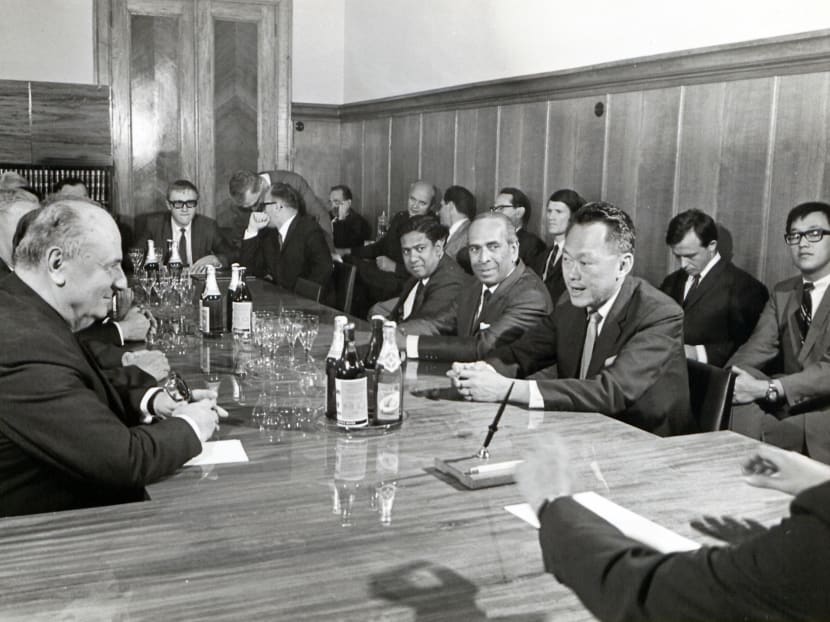S R Nathan: On call, for when results were needed
SINGAPORE — A “stable, steady person who can accomplish things” was how Mr Lee Kuan Yew once described Mr S R Nathan. No surprise, then, that throughout his accomplished career, Mr Nathan was often sent in where Mr Lee needed results; akin to a one-man “Mr Fix-It”.

Mr SR Nathan at the negotiating table with Foreign Minister S Rajaratnam and Singapore's first Prime Minister Lee Kuan Yew during a visit to Russia in 1970. Photo: Mr Nathan's personal collection
SINGAPORE — A “stable, steady person who can accomplish things” was how Mr Lee Kuan Yew once described Mr S R Nathan. No surprise, then, that throughout his accomplished career, Mr Nathan was often sent in where Mr Lee needed results; akin to a one-man “Mr Fix-It”.
Although he frequently had no experience or expertise in the area he was tasked to deal with, Mr Nathan never disappointed.
An indication of the regard Mr Nathan was held in was when he was told to head the Security and Intelligence Department, a sensitive post responsible for collecting external security-related information for the political leadership, and ensuring these were reliable and accurate enough to form responses or policy to.
His time in that role (1971 to 1979) was marked — to the public, at least — by his handling of the Laju incident in 1974, where he risked his life to accompany the hijackers of a ferryboat on a flight to Kuwait in exchange for the safe release of Singaporean hostages.
This was “quintessential Mr Nathan: Always placing country before self”, as Prime Minister Lee Hsien Loong put it, in a tribute on the former’s 90th birthday celebrations.
A few years later, Mr Nathan again ventured into an unheralded area: Newspapers.
The Government’s relations with The Straits Times had deteriorated to the extent that Mr Lee was ready to send in senior civil servants to “cut out the rot”.
Mr Lee viewed that the paper portrayed the government and its policies negatively, without basis, possibly under the influence of foreign journalists in the post-Watergate culture. Mr Lee also wanted to fix the issue of local journalists who were lacking in understanding of the particular circumstances confronting Singapore, and their roles in nation-building.
Mr Nathan was put forward, and Mr Lee trusted him to do the job — an unenviable balancing act between meeting the Government’s expectations and assuaging concerns among journalists suspicious of a former spy chief’s entrance.
At his final meeting with Mr Lee before he joined as executive chairman of Straits Times Press in 1982, Mr Nathan was told: “Nathan — I am giving you the Straits Times. It has 150 years of history. It has been a good paper. It is like a bowl of China. If you break it, I can piece it together. But it will never be the same. Try not to destroy it.”
When he was asked why he had no response, Mr Nathan only said: “Sir, you have told me what to do. Also, what I should not do. What is there for me to say? I’ll try.”
While he was greeted with inevitable hostility and suspicion by the newspaper’s employees at the start, Mr Nathan gained their trust and respect slowly but surely by proving that he was not interested in usurping their editorial positions or in mindless gatekeeping, much less censorship.
In his six years on the job, Mr Nathan said in his memoirs that he had to act as a buffer in serious disputes and do his best to defuse various situations.
In his quiet way, he built up mutual understanding with the senior editors in the newsroom and introduced changes that lifted the journalistic standards at The Straits Times.









